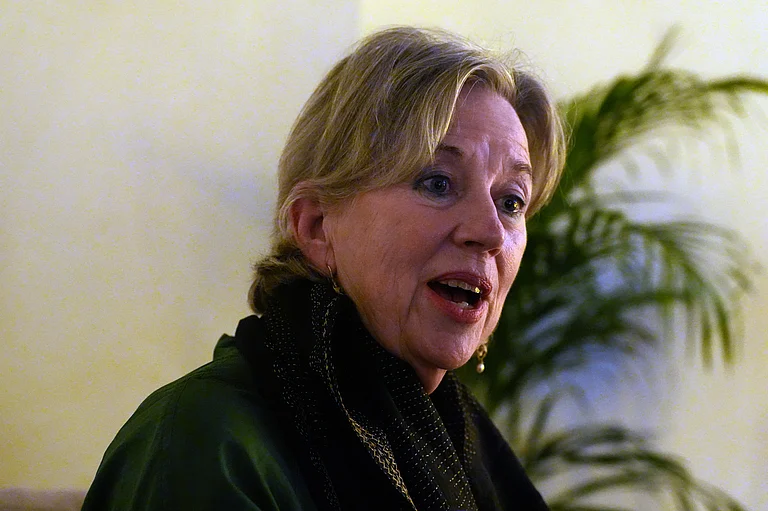As we commemorate International Women's Day, it is fitting to shine a spotlight on the exemplary women steering the course of environmental progress. From trailblazing eco-entrepreneurs to passionate environmental advocates, these women epitomize the spirit of resilience and transformative leadership. In honouring their endeavours, we not only celebrate the strides they've made in sustainability but also recognize the intersectionality of their roles as women contributing to a brighter, more eco-conscious future. This Women's Day, let's acknowledge and applaud the inspiring stories of Women Leading Environmental Change, embodying the ethos of empowerment and positive impact.
Walking The Sustainable Path
In 2020, findings from the World Economic Forum unveiled a stark reality: the global fashion sector was responsible for 10% of the world's overall carbon emissions and a staggering 20% of industrial water pollution. These alarming figures signalled an urgent need for change in an industry teetering on the edge of an environmental crisis.
Amid this critical juncture, a less-is-more ethos has emerged as a crucial element in the fashion world's journey towards a more conscious era of consumption and creation. The escalating toll on the environment has prompted a growing inclination towards mindful practices, epitomized by the ascent of resale markets, pre-loved fashion, and designers prioritizing sustainability in their creations. Although strides have been made, there remains considerable work ahead to fully realize a conscientious and sustainable fashion industry.
Against this backdrop, Saritoria, a peer-to-peer platform facilitating the buying and selling of pre-owned luxury items, emerges as a welcome addition. It signifies a step towards a more sustainable and mindful approach to fashion consumption, acknowledging the imperative for further efforts in reshaping the industry's impact on the environment.
Shehlina Soomro, CEO and founder of Saritoria, shares, “The pandemic prompted a re-evaluation of life's priorities, prompting many to realize the excessive accumulation of possessions. During lockdown, there was a concerted effort to declutter and engage in necessary mental detoxification. It became apparent that South Asian clothing occupies a significant portion of closet space and is reused less compared to Western attire, despite the considerable human and environmental resources invested in each garment. Given the disproportionate impact of climate change on South Asia, I feel it is crucial for our community to reconsider its choices. Amid discussions of post-pandemic recovery and the idea of "building back better," Saritoria was conceived as a solution to empower the 1.8 billion South Asians and diaspora to participate in the circular economy. Surprisingly, while 85% of textiles ultimately end up in landfills or incinerators, there was a notable absence of easily accessible solutions to extend the lifespan of garments for South Asian brands, unlike their Western counterparts. Therefore, I felt the need to bring Saritoria to address this disparity.”
Merging Elegance With Eco-Conscious Practices
Meanwhile, Crimzon World, beyond its sartorial elegance, pioneers sustainability in the realm of luxury footwear. The shared commitment to eco-conscious practices ties these brands together, presenting a unified front in shaping a more mindful and responsible industry landscape. Established in 2003 by Sonali Dalwani, a designer specializing in footwear and accessories, the brand aims to infuse global sophistication into shoes while embracing Indian style.
Sonali Dalwani, the founder of Crimzon, asserts, “My journey in the fashion industry began in 1989, crafting embroideries for French and Italian fashion houses before venturing into the production of European market shoes. Working closely with iconic brands like Karl Lagerfeld and Emanuel Ungaro, I honed my craft and furthered my technical expertise through a shoe sculpting course at the prestigious Arsutoria School in Milan and New York. Driven by the absence of top-notch Indian footwear for women, I decided to launch Crimzon, turning my passion into a two-decade-old business. Today, with flagship stores in Khar and Hughes Road, Crimzon celebrates individuality, navigating the delicate balance between contemporary and classic styles. Under my leadership, the brand thrives on unwavering commitment to quality, superior craftsmanship, and a sophisticated aesthetic.”

As time passed, her sons Rohaan Dalwani and Rahul Dalwani have taken the reins, dedicated to carrying forward the legacy of Crimzon. The brand continues to merge traditional opulence with modern designs, with a focus on eco-conscious practices by crafting each shoe from vegan faux leather. Specializing in tailored bespoke service and boasting a dedicated bridal line, Crimzon designs are meticulously created for the confident and practical modern woman who knows her mind. The brand's emphasis on both style and comfort has earned the patronage of celebrities such as Alia Bhatt, Priyanka Chopra, Madhuri Dixit-Nene, and Dipannita Sharma, solidifying Crimzon's status as a beacon of refined elegance.
Crimzon not only emphasizes style but also eco-conscious practices, handcrafting shoes using vegan faux leather.
ALSO READ | At 97, Vidya Stokes Is Unstoppable
Dalwani says, “At Crimzon, sustainability is not just a trend but a fundamental aspect of our ethos. Our commitment to eco-conscious practices stems from a pragmatic approach to production, minimizing waste and maximizing efficiency. Utilizing vegan faux leather and eco-friendly adhesives, we prioritize ethical sourcing and production methods without compromising on style or quality. Embracing centuries-old handcrafted traditions further reduces our environmental footprint, resonating with the values of the confident and practical modern woman that Crimzon proudly serves. Through our commitment to customization, we also ensure that each product is meticulously crafted to meet individual preferences, thereby reducing wasteful over-production and aligning with our ethos of sustainability.”
For The Sake of Environment
The Baker's Dozen, India's foremost artisan bakery brand, has recently turned plastic neutral and is looking to offset 1000 tonnes of its carbon footprint via opting for green deliveries.
Aditi Handa, Co-founder and Head Chef, The Baker's Dozen opines, “A dozen means 12 and The Baker’s Dozen means 13. To us this means going a step extra in everything we do: this can be quality of ingredients, customer service, how we treat our employees. A natural extension of this was to start giving back to the environment. Global warming is not a debatable topic anymore, it is a reality. In 2023 we decided to start taking meaningful steps in this direction and contributing back to the environment. We identified our carbon footprint and as of FY 24 we are plastic-neutral and have green deliveries. This means we have recycled as much plastic as we have used and the entire transport footprint has been set off.”

The Baker's Dozen prioritizes environmental sustainability in its food delivery through a two-step approach: reducing carbon footprint with electric vehicles and optimized routes, and offsetting remaining emissions by supporting recycling and renewable energy projects.
She accentuates, “As a woman leader in the culinary world, I view my role as an opportunity to champion sustainable and eco-friendly practices within the industry. At The Baker's Dozen, we are deeply committed to sustainability, and I am passionate about leading by example. Whether it's sourcing locally grown ingredients or implementing waste reduction strategies in our kitchens, we continuously strive to set a positive example for our peers. By promoting sustainability in the culinary world, I hope to inspire others to embrace environmentally conscious practices and contribute to a healthier planet.”
Empowering On The Way
Another accessories label, Dharma Originals thrives on simplicity with a powerful impact. Their sustainable approach is seamlessly woven into the brand's fabric, from empowering women and children to meticulous eco-friendly product creation. With 100% organic materials and a commitment to social responsibility, Dharma effortlessly delivers both simplicity and meaningful impact.
But what sets Dharma apart is the fact that the brand firmly believes in empowering others. Founder, Charu Sachdev, says, “The idea of Dharma Originals came to fruition as a realization of our innate purpose to
serve others while utilizing our unique talents and gifts. We believe that by blending our creativity and passion for fashion with a commitment to empowering urban women, we can create a meaningful change in the world. Inspired by the multiple forms of discrimination faced by women in their everyday lives, including increased risk of poverty and limited access to resources, we saw an opportunity to make a difference. By creating stylish, versatile and gender-neutral bags and accessories that are sustainable, ethically produced and environmentally conscious, we aim to not only offer high-quality products but also to contribute to the economic empowerment of women in urban areas.”

Dharma Originals focuses on enhancing the well-being of individuals in the production process through targeted measures. They address challenges faced by female slum dwellers, emphasizing access to essential services, education, and employment opportunities. The company also supports women by offering affordable childcare and schooling, enabling them to engage in employment and contribute meaningfully to their families and communities. Additionally, they provide gainful employment opportunities, either in proximity to home or through household microenterprises.
Art as a Means of Environmental Rebellion
Art as a form of environmental rebellion serves as a poignant medium for conveying messages of positive change. Through vibrant canvases, thought-provoking sculptures, or compelling installations, artists channel their creativity to raise awareness about pressing environmental issues. These works not only capture the eye but also resonate with the viewer's conscience, prompting reflection on the consequences of human actions. Whether addressing climate change, deforestation, or pollution, art becomes a silent yet resonant protest, urging society to reevaluate its relationship with the planet. In this way, the brush strokes and sculpted forms become a collective voice, echoing the urgency for sustainable practices and a harmonious coexistence with nature.
One such example is Vibha Galhotra. She prefers to be called an artist and not an activist. Galhotra explains, “For over a decade, I've been engaged in a social art practice that delves into the pressing concerns surrounding the changing environment, specifically focusing on the Anthropocene era. Drawing inspiration from the historical role of art as a lens to different times and spaces, my work seeks to address the imminent collapse of nature due to our relentless capital-driven practices. I firmly believe that we stand on the precipice of a global crisis, and I channel my artistic expression through the lens of my local context – Delhi. Utilizing the mucky sediment of the Yamuna river as my painting material, I perform these works at the ghat while consistently documenting my surroundings. Witnessing the unfortunate intersection of political and individual ownership of resources adds a poignant layer to my exploration of these urgent global issues.“

















